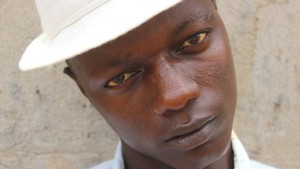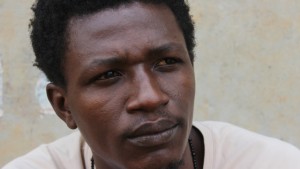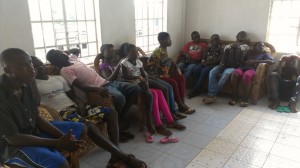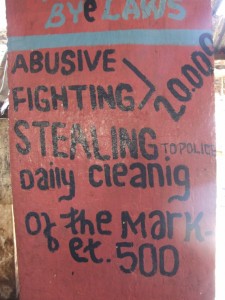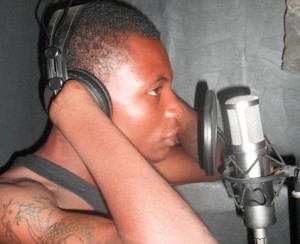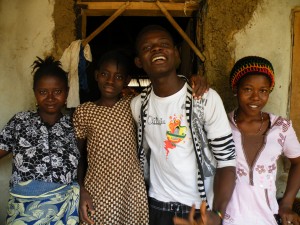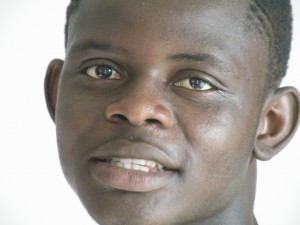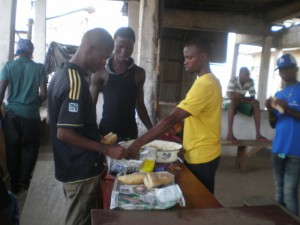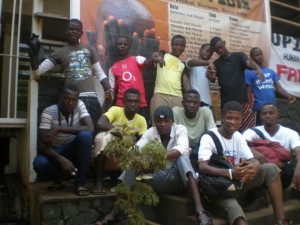Pastoral Care
Many of the young people who come in to the WAYout hub are just looking for somewhere to be safe. Somewhere to hang out without being arrested for loitering. Somewhere to sleep out of the rain. They have heard of us as a place street youth are welcome. This is often our first contact with them and from there we talk to them and try and find out if they have family, if they are interested in going back to school or starting school, if they want to record a music track or learn about filmmaking.
When someone has been coming for at least six months and has shown that they want to learn, they are entitled to apply for a grant for help with getting a home or for basic literacy classes and sometimes, for travel to see long lost family. So far 72 grants for homes have been given. Here is a short film about the grant scheme, made by a WAYout member. Pictured above- Alusine Kamara aka Easyman and Gassimu Sesay aka Gas P are amongst the young people who have received grants for homes.
We recently introduced Tai Chi in the mornings to support general wellbeing.
Sometimes change is a slow process but we have always been about people, not statistics, so once someone comes in to WAYout we don’t give up on them and they come to know that, if they don’t turn up for a few days, someone will wonder where they are and come looking for them. This trust and sense of belonging is the beginning of change.
Approximately 30% of the 20-35 year olds we work with were combatants during the ten year conflict and lived outside society- a volatile and excluded minority who felt society had rejected them, who were unemployed and had nowhere to live. They admitted they would fight again if someone offered them money to do it- they had nothing to lose. But now, following the opportunities offered them by WAYout, they have other goals in life and people are no longer afraid of them. We are committed to continue working with ex combatants.
Everyone is an individual so the path back to a life that they would define as meaningful is different for each one. Sometimes finding them a home is key to their being able to return to education. Others can focus on training or creativity whilst still living on the streets. Many times we have been told that having a music recording or a video they have made has opened the door back to their community and home. The fact that someone else took them seriously enough to record their music means they are seen as productive and reliable again.
The Black Street Family are an ever growing group of street youth living in central Freetown. They range in age from 7 to 35. They were once feared and avoided but not any more. Since they recorded their first album with WAYout, they find people will come and talk to them, sit with them- no longer afraid. This has encouraged them to live up to this new expectation and the number dealing drugs or picking pockets has dropped and they now have a set of fines for bad behaviour.
We try and encourage the young people who come in to engage with education or training but if they feel they can’t, perhaps because they are afraid of failing or find concentration difficult, perhaps because it’s not cool or they see no purpose in it, we welcome them anyway. Generally being around other young people who are getting excited about something they are doing awakens their interest. Sometimes they engage with something by stealth. As if they are hoping we haven’t noticed. Whatever works for them, works for us.
Komba had his hand blown off when he was five years old. His mother could not care for him so he ended up on the streets of Freetown where he lived until he was 18. He wandered in to the studio one day- someone on the street had told him about WAYout so he came to check us out. He recorded two tracks. One called ‘Diamond Briefcase’ and the other ‘Mama Don’t Worry’. Then he went home to see his mother for the first time in 11 years. He felt he could return with his head held high and his CD in hand. ‘Diamond Briefcase’ won a local hip hop competition and Komba is now recording an album.
J.J. ran away from home when he was ten years old, following an argument with his sister in which he hit her with a stone. Afraid of the punishment he might get, he ran away. J.J. was eighteen when he joined The Way street film group and he hadn’t seen his family since the day he left home. He sometimes sent photographs, or even money if he had any, to his mother but she never got them. When we heard his story we took J.J. to Kenema to see his family again. His mother had looked for him every day but thought he must be dead and it took her a while to accept he wasn’t a ghost. Now, J.J. is off the street and making money selling DVDs. He sees his mother regularly and is still part of The Way film group and now makes a living shooting videos..
The Way Street Film group meets regularly and every Sunday we give them money for food. We knew that some of them would, initially, just come for the food but we also knew that some of them would keep coming because they liked the sense of belonging to something, the sense of achievement and purpose. It works because there are now 50 members, 12 of them female and they are working on their next drama as well as short documentaries.


